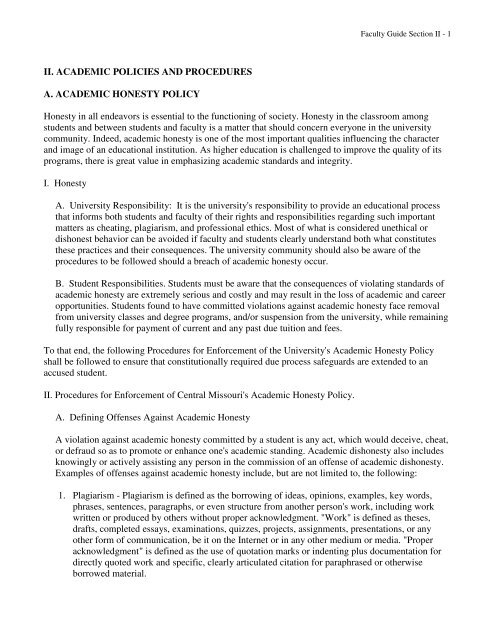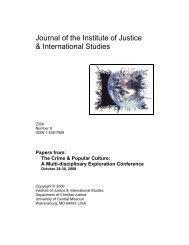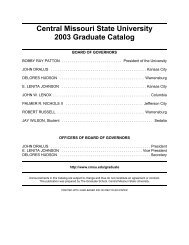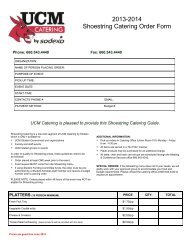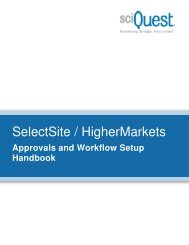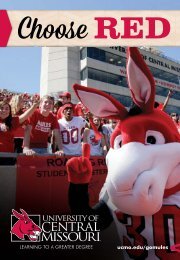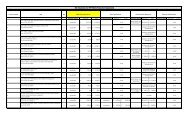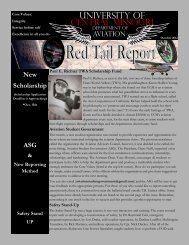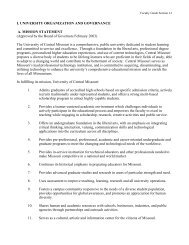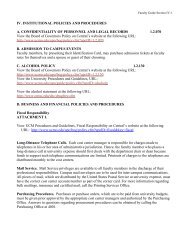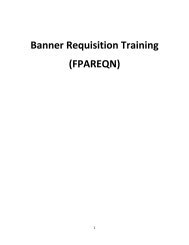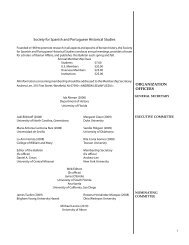Academic Policies and Procedures - University of Central Missouri
Academic Policies and Procedures - University of Central Missouri
Academic Policies and Procedures - University of Central Missouri
Create successful ePaper yourself
Turn your PDF publications into a flip-book with our unique Google optimized e-Paper software.
Faculty Guide Section II - 1<br />
II. ACADEMIC POLICIES AND PROCEDURES<br />
A. ACADEMIC HONESTY POLICY<br />
Honesty in all endeavors is essential to the functioning <strong>of</strong> society. Honesty in the classroom among<br />
students <strong>and</strong> between students <strong>and</strong> faculty is a matter that should concern everyone in the university<br />
community. Indeed, academic honesty is one <strong>of</strong> the most important qualities influencing the character<br />
<strong>and</strong> image <strong>of</strong> an educational institution. As higher education is challenged to improve the quality <strong>of</strong> its<br />
programs, there is great value in emphasizing academic st<strong>and</strong>ards <strong>and</strong> integrity.<br />
I. Honesty<br />
A. <strong>University</strong> Responsibility: It is the university's responsibility to provide an educational process<br />
that informs both students <strong>and</strong> faculty <strong>of</strong> their rights <strong>and</strong> responsibilities regarding such important<br />
matters as cheating, plagiarism, <strong>and</strong> pr<strong>of</strong>essional ethics. Most <strong>of</strong> what is considered unethical or<br />
dishonest behavior can be avoided if faculty <strong>and</strong> students clearly underst<strong>and</strong> both what constitutes<br />
these practices <strong>and</strong> their consequences. The university community should also be aware <strong>of</strong> the<br />
procedures to be followed should a breach <strong>of</strong> academic honesty occur.<br />
B. Student Responsibilities. Students must be aware that the consequences <strong>of</strong> violating st<strong>and</strong>ards <strong>of</strong><br />
academic honesty are extremely serious <strong>and</strong> costly <strong>and</strong> may result in the loss <strong>of</strong> academic <strong>and</strong> career<br />
opportunities. Students found to have committed violations against academic honesty face removal<br />
from university classes <strong>and</strong> degree programs, <strong>and</strong>/or suspension from the university, while remaining<br />
fully responsible for payment <strong>of</strong> current <strong>and</strong> any past due tuition <strong>and</strong> fees.<br />
To that end, the following <strong>Procedures</strong> for Enforcement <strong>of</strong> the <strong>University</strong>'s <strong>Academic</strong> Honesty Policy<br />
shall be followed to ensure that constitutionally required due process safeguards are extended to an<br />
accused student.<br />
II. <strong>Procedures</strong> for Enforcement <strong>of</strong> <strong>Central</strong> <strong>Missouri</strong>'s <strong>Academic</strong> Honesty Policy.<br />
A. Defining Offenses Against <strong>Academic</strong> Honesty<br />
A violation against academic honesty committed by a student is any act, which would deceive, cheat,<br />
or defraud so as to promote or enhance one's academic st<strong>and</strong>ing. <strong>Academic</strong> dishonesty also includes<br />
knowingly or actively assisting any person in the commission <strong>of</strong> an <strong>of</strong>fense <strong>of</strong> academic dishonesty.<br />
Examples <strong>of</strong> <strong>of</strong>fenses against academic honesty include, but are not limited to, the following:<br />
1. Plagiarism - Plagiarism is defined as the borrowing <strong>of</strong> ideas, opinions, examples, key words,<br />
phrases, sentences, paragraphs, or even structure from another person's work, including work<br />
written or produced by others without proper acknowledgment. "Work" is defined as theses,<br />
drafts, completed essays, examinations, quizzes, projects, assignments, presentations, or any<br />
other form <strong>of</strong> communication, be it on the Internet or in any other medium or media. "Proper<br />
acknowledgment" is defined as the use <strong>of</strong> quotation marks or indenting plus documentation for<br />
directly quoted work <strong>and</strong> specific, clearly articulated citation for paraphrased or otherwise<br />
borrowed material.
Faculty Guide Section II - 2<br />
2. Cheating - Includes, but is not limited to, those activities where a student (either on campus or<br />
on-line):<br />
(a) obtains or attempts to obtain pre-knowledge content <strong>of</strong> an examination;<br />
(b) copies someone else's work;<br />
(c) works in a group when the student has been told to work individually;<br />
(d) uses unauthorized reference material in an examination;<br />
(e) has someone else take an examination.<br />
(f) has someone else complete course work <strong>and</strong>/or an examination using a student’s secure log in<br />
<strong>and</strong> pass code.<br />
3. Breach <strong>of</strong> St<strong>and</strong>ards <strong>of</strong> Pr<strong>of</strong>essional Ethics - In certain degree programs, students will be<br />
instructed on <strong>and</strong> provided with that particular pr<strong>of</strong>ession's code <strong>of</strong> ethics (e.g. The American<br />
Nurses Associations Code for Nurses). Under some circumstances, if a student is found to have<br />
violated that pr<strong>of</strong>essional code, that violation may be considered a breach <strong>of</strong> the <strong>Academic</strong><br />
Honesty Policy.<br />
B. Reporting Violations <strong>of</strong> the <strong>Academic</strong> Honesty Policy (revised July 1998)<br />
If a faculty member believes that a student has committed a violation <strong>of</strong> the <strong>Academic</strong> Honesty<br />
Policy with regard to an examination or other assigned work (laboratory assignment, term paper,<br />
etc.), the faculty member shall preserve any evidence (e.g. plagiarized article, examination or other<br />
material) which substantiates that a violation has occurred. Within one week <strong>of</strong> the incident, the<br />
faculty member will schedule a private conference with the student, advise him/her that the faculty<br />
member believes a violation <strong>of</strong> this Policy occurred, <strong>and</strong> allow the student to provide his/her side <strong>of</strong><br />
the story or otherwise <strong>of</strong>fer an explanation. Upon consideration <strong>of</strong> the information, if any, provided<br />
by the student, the faculty member shall make an independent determination within five calendar<br />
days whether a violation <strong>of</strong> the <strong>Academic</strong> Honesty Policy has occurred. If the faculty member is<br />
unable, for whatever reason, to contact the student within a five-class day period, the incident will be<br />
reported to the faculty member's department chair for further action.<br />
(1) In the event the faculty member finds no violation <strong>of</strong> the <strong>Academic</strong> Honesty Policy has occurred,<br />
the faculty member shall notify the student, in writing, <strong>of</strong> this finding.<br />
(2) In the event the faculty member determines a violation <strong>of</strong> the <strong>Academic</strong> Honesty Policy has<br />
occurred, he/she shall notify the student, within five class days, in writing, <strong>of</strong> this finding. The written<br />
notification shall contain a statement <strong>of</strong> finding <strong>and</strong> shall specify the provision <strong>of</strong> the policy violated<br />
<strong>and</strong>, consistent with the severity <strong>of</strong> the violation, shall indicate which <strong>of</strong> the following action(s)<br />
he/she shall take:<br />
a. Give the student an opportunity to resubmit the assignment or be retested to make up the<br />
work or test where the violation occurred;<br />
b. Assign a grade <strong>of</strong> "F" to the assignment or examination affected by the violation;<br />
c. Assign a grade <strong>of</strong> "F" for the course;<br />
d. Recommend to the Office <strong>of</strong> the Vice Provost for Student Experience <strong>and</strong> Engagement, <strong>and</strong><br />
the Dean <strong>of</strong> Graduate <strong>and</strong> Extended Studies if the student is enrolled for graduate credit,<br />
that the student be disenrolled from class;
Faculty Guide Section II - 3<br />
e. Recommend to the Department Chair <strong>and</strong> the Vice Provost for Student Experience <strong>and</strong><br />
Engagement, <strong>and</strong> the Dean <strong>of</strong> Graduate <strong>and</strong> Extended Studies if the student is enrolled for<br />
graduate credit, that the student be removed from the degree program; or<br />
f. Recommend to the Office <strong>of</strong> the Vice Provost for Student Experience <strong>and</strong> Engagement that<br />
the student be suspended from the university.<br />
(3) In the event the faculty member determines a violation <strong>of</strong> the <strong>Academic</strong> Honesty Policy has<br />
occurred, the faculty member will provide the Office <strong>of</strong> the Vice Provost for Student Experience <strong>and</strong><br />
Engagement a copy <strong>of</strong> the written notice to the student, accompanied by a summary <strong>of</strong> all evidence.<br />
The faculty member shall keep the evidence <strong>and</strong> a copy <strong>of</strong> all summaries <strong>and</strong> documentation on file<br />
in the event the student wishes to appeal the faculty member's decision. The faculty member may<br />
interview other students <strong>and</strong> members <strong>of</strong> the university community to ascertain the pertinent facts <strong>and</strong><br />
circumstances <strong>and</strong> may request written statements from them. However, anonymity <strong>of</strong> witnesses or<br />
witness statements cannot be guaranteed.<br />
(4) In the event that the student does not appeal the faculty member's decision within ten class days <strong>of</strong><br />
notification, the faculty member's decision shall become final <strong>and</strong> the recommended action shall take<br />
place.<br />
(5) A student charged with a violation <strong>of</strong> this policy shall not be barred from participating in <strong>and</strong><br />
attending classes, or from taking quizzes, tests <strong>and</strong>/or final examinations during the ten-day period<br />
described in paragraph (4) (above) <strong>and</strong>/or during the appeal process.<br />
C. Student Appeal Process<br />
In the event a student charged with a violation <strong>of</strong> this policy disagrees with the faculty member's<br />
decision <strong>and</strong> wishes to appeal, the student is responsible for notifying the appropriate parties where<br />
he/she may be reached for purposes <strong>of</strong> appeal <strong>and</strong> must follow the following process:<br />
Level 1 <strong>of</strong> The Appeal Process<br />
Within five (5) class days <strong>of</strong> receipt <strong>of</strong> the faculty member's decision, the student should schedule a<br />
meeting with the faculty member's department chair. The chair will review the faculty member's<br />
documentation <strong>and</strong> evidence, review the circumstances with the student, <strong>and</strong> if possible, consult the<br />
faculty member. The chair will determine within five (5) class days <strong>of</strong> the meeting an appropriate action<br />
which may include, but is not limited to, endorsing, modifying, or overturning the faculty member's<br />
original decision, or he/she may determine an alternate course <strong>of</strong> action.<br />
The chair shall communicate his/her decision to the student, faculty member, <strong>and</strong> the Office <strong>of</strong> the Vice<br />
Provost for Student Experience <strong>and</strong> Engagement, <strong>and</strong> prepare a report <strong>of</strong> the evidence <strong>and</strong> reasons for<br />
making this decision.<br />
Level 2 <strong>of</strong> The Appeal Process<br />
In the event the student disagrees with the chair's actions, he/she may request a meeting with the college<br />
dean, to be scheduled within five (5) class days <strong>of</strong> receipt <strong>of</strong> the chair's decision. The dean will discuss<br />
the facts <strong>and</strong> circumstances <strong>of</strong> the violation with the student <strong>and</strong> other involved parties, on a collective<br />
or individual basis depending on the circumstances. The dean may also interview witnesses <strong>and</strong><br />
undertake further investigative activities if he/she believes the circumstances merit further action. The<br />
dean shall complete his/her meetings <strong>and</strong> investigation <strong>and</strong> issue a finding within fifteen (15) class days<br />
<strong>of</strong> receipt <strong>of</strong> the student's appeal. In the event the dean is unable to accommodate this time frame, the
Faculty Guide Section II - 4<br />
student <strong>and</strong> other affected parties will be notified <strong>of</strong> this fact <strong>and</strong> the anticipated length <strong>of</strong> time needed to<br />
render a decision. The dean will notify the student, faculty member, chair, <strong>and</strong> Vice Provost for Student<br />
Experience <strong>and</strong> Engagement <strong>of</strong> his/her findings, <strong>and</strong> his/her intended course <strong>of</strong> action in writing.<br />
Level 3 <strong>of</strong> The Appeal Process<br />
If the student disagrees with the dean's decision, the student may request, within five (5) class days <strong>of</strong><br />
receipt <strong>of</strong> notification <strong>of</strong> the dean's decision, a meeting with the Provost. The Provost will consider all<br />
the evidence on the record <strong>and</strong> shall decide, within ten (10) class days to take one <strong>of</strong> the following<br />
actions:<br />
(1) Uphold one or all <strong>of</strong> the previous decisions.<br />
(2) Overturn the decisions outright <strong>and</strong> make an alternate resolution.<br />
(3) Refer the matter to a university grievance committee. The Provost will appoint a committee <strong>of</strong><br />
two students <strong>and</strong> two faculty members to review the matter within fifteen class days <strong>of</strong> the<br />
Provost's referral. The committee will make its recommendation to the Provost within five (5)<br />
days <strong>of</strong> completing its work. In the event <strong>of</strong> a tie vote <strong>of</strong> the committee, the Provost shall cast<br />
the deciding vote. The Provost shall immediately, upon receipt <strong>of</strong> the committee's<br />
recommendation, notify the student <strong>of</strong> the grievance committee's decision in writing.<br />
The Provost's decision is final <strong>and</strong> binding on all parties, <strong>and</strong> once communicated, shall be placed in full<br />
force <strong>and</strong> effect immediately.<br />
Questions concerning this policy or other issues related to academic honesty should be addressed to the<br />
Office <strong>of</strong> the Provost or the Office <strong>of</strong> Student Experience <strong>and</strong> Engagement.<br />
B. ACADEMIC ADVISEMENT<br />
<strong>Academic</strong> advising is critical to the success, satisfaction, retention, <strong>and</strong> graduation <strong>of</strong> <strong>University</strong> <strong>of</strong><br />
<strong>Central</strong> <strong>Missouri</strong> students. <strong>Academic</strong> advising is an ongoing interactive process involving the student,<br />
advisors, faculty, staff <strong>and</strong> the institution. The primary goal <strong>of</strong> academic advising is to aid students in<br />
developing personal, pr<strong>of</strong>essional, <strong>and</strong> career goals that are challenging, worthwhile, <strong>and</strong> realistic, <strong>and</strong><br />
planning degree completion programs that achieve these goals.<br />
The <strong>University</strong> <strong>of</strong> <strong>Central</strong> <strong>Missouri</strong> utilizes a “split model” form <strong>of</strong> <strong>Academic</strong> Advisement. The<br />
Gateway Advising <strong>and</strong> Major Exploration Center is staffed with pr<strong>of</strong>essional advisors who serve new<br />
transfer students that are undecided(Open Option students) about their major. All other students are<br />
assigned to the college <strong>of</strong> their major for advising by pr<strong>of</strong>essional <strong>and</strong>/or faculty academic advisors.<br />
Students are required to see an advisor during freshman/ transfer student orientation. Students may<br />
access their enrollment via My<strong>Central</strong>. An electronic degree audit is available on-line to each student<br />
through their My <strong>Central</strong> account (under Student Services tab – UCM Student Records). Transfer<br />
course equivalencies are established by the academic departments <strong>and</strong> available to students on-line as<br />
well. Students may schedule an advisement appointment by contacting their appropriate Advising<br />
Center.<br />
Graduate students are advised solely by the assigned faculty advisor in their respective academic<br />
departments. (updated June 2012)
Faculty Guide Section II - 5<br />
C. COMMENCEMENT -- FACULTY ROLE<br />
Faculty members are expected to participate in commencement activities. All faculty are encouraged to<br />
participate in college/department receptions occurring with each commencement. Faculty are to attend a<br />
commencement once a year. The academic processional, which is organized by colleges <strong>and</strong><br />
departments, requires full academic attire. Caps, gowns, <strong>and</strong> hoods may be purchased or rented through<br />
the <strong>University</strong> Store.<br />
D. FACULTY MEETINGS<br />
In the fulfillment <strong>of</strong> their pr<strong>of</strong>essional responsibilities, faculty members are expected to attend <strong>and</strong><br />
participate in university, college, school, department <strong>and</strong> other unit meetings. Such meetings are<br />
important modes <strong>of</strong> communication <strong>and</strong> contribute significantly to internal decision-making <strong>and</strong><br />
underst<strong>and</strong>ing <strong>of</strong> policies at all administrative levels.<br />
E. GRADUATE FACULTY<br />
THE GRADUATE FACULTY ASSEMBLY<br />
OF UNIVERSITY OF CENTRAL MISSOURI<br />
The Graduate Faculty Assembly is comprised <strong>of</strong> all members <strong>of</strong> the Graduate Faculty <strong>and</strong> the<br />
Administrators assigned to Graduate Studies in the School <strong>of</strong> Graduate <strong>and</strong> Extended Studies. It<br />
provides a forum for discussion <strong>of</strong> graduate education issues <strong>and</strong> elects members to the Graduate<br />
Council <strong>and</strong> the Graduate Faculty Review Committee. Members <strong>of</strong> the Graduate Faculty are recognized<br />
as associate or full members with differing rights <strong>and</strong> responsibilities. The qualifications for graduate<br />
faculty status <strong>and</strong> application forms are located at:<br />
http://www.ucmo.edu/graduate/faculty/facstat.cfm<br />
THE GRADUATE COUNCIL<br />
OF UNIVERSITY OF CENTRAL MISSOURI<br />
The Graduate Council serves as an administrative committee for the Provost/Chief Learning Officer <strong>and</strong><br />
a recommending body to the Dean <strong>of</strong> the School <strong>of</strong> Graduate <strong>and</strong> Extended Studies. It develops <strong>and</strong><br />
reviews <strong>University</strong> policies <strong>and</strong> procedures for graduate education; reviews <strong>and</strong> recommends graduate<br />
curriculum; monitors the quality <strong>of</strong> graduate programs <strong>of</strong> the <strong>University</strong>; <strong>and</strong> advises the Dean <strong>of</strong> the<br />
School <strong>of</strong> Graduate <strong>and</strong> Extended Studies on university, college, <strong>and</strong> department policies <strong>and</strong> procedures<br />
as set forth in the Graduate Catalog. Members are elected by the Graduate Faculty Assembly. The<br />
<strong>of</strong>ficial charge <strong>and</strong> membership list are located on the Provost’s website at:<br />
http://www.ucmo.edu/provost/committees/grad.cfm<br />
THE GRADUATE FACULTY REVIEW COMMITTEE<br />
The Graduate Faculty Review Committee serves to review initial <strong>and</strong> reappointment applications for<br />
Full Graduate Faculty Status <strong>and</strong> the first level <strong>of</strong> review for appeals from faculty whose applications<br />
were not approved by the department chair <strong>and</strong>/or dean <strong>of</strong> the academic unit. The committee serves as<br />
the first level <strong>of</strong> review for appeals from faculty whose applications for Associate Graduate Faculty
Faculty Guide Section II - 6<br />
Status are not approved by the Dean <strong>of</strong> the School <strong>of</strong> Graduate <strong>and</strong> Extended Studies. Members are<br />
elected by the Graduate Faculty Assembly. The committee charge <strong>and</strong> membership list is located at:<br />
http://www.ucmo.edu/graduate/gradfac/review.cfm<br />
F. INSTRUCTIONAL PROCEDURES<br />
1. Course Syllabi. Teaching faculty are expected to follow current course syllabi which are on file in<br />
department <strong>of</strong>fices <strong>and</strong> in the <strong>of</strong>fice <strong>of</strong> the appropriate college dean. It is the responsibility <strong>of</strong> the<br />
department to ensure the program’s quality <strong>and</strong> learning goals are consistent across all sections <strong>of</strong> a<br />
course, regardless <strong>of</strong> mode <strong>of</strong> delivery, location, instructor, or teaching arrangement (i.e., contractual<br />
or consortial).<br />
Faculty members will prepare syllabi for distribution in classes at the beginning <strong>of</strong> each semester<br />
that include instructional procedures <strong>and</strong> guidelines. These guidelines should include an outline <strong>of</strong><br />
course content, expectations for student engagement, basic instructional procedures, course schedule,<br />
assessment measures, grading policies <strong>and</strong> practices, attendance policies <strong>and</strong> related matters <strong>of</strong><br />
interest <strong>and</strong> concern.<br />
When designing a course, it is particularly important that the amount <strong>of</strong> student engagement or work<br />
in the course’s intended learning outcomes assigned by faculty <strong>and</strong> verified by evidence <strong>of</strong> student<br />
achievement, is appropriate for the credit hours awarded.<br />
A credit hour is an amount <strong>of</strong> work represented in intended learning outcomes <strong>and</strong> verified by<br />
evidence <strong>of</strong> student achievement that is an institutionally-established equivalency that reasonably<br />
approximates not less than: (1) one hour <strong>of</strong> classroom or direct faculty instruction <strong>and</strong> a minimum <strong>of</strong><br />
two hours <strong>of</strong> out-<strong>of</strong>-class student work each week for approximately fifteen weeks for one semester<br />
hour <strong>of</strong> credit or the equivalent amount <strong>of</strong> work over a different amount <strong>of</strong> time; or (2) at least an<br />
equivalent amount <strong>of</strong> work as required in (1) <strong>of</strong> this definition for other activities as established by<br />
an institution, including laboratory work, internships, practica, studio work, <strong>and</strong> other academic<br />
work leading toward the award <strong>of</strong> credit hours; or (3) institutionally established reasonable<br />
equivalencies for the amount <strong>of</strong> work described above in paragraph (1) <strong>of</strong> this definition for the<br />
credit hours awarded, as represented by verifiable student achievement <strong>of</strong> intended learning<br />
outcomes.<br />
2. Office Hours. Faculty members are to maintain a minimum <strong>of</strong> five scheduled <strong>of</strong>fice hours per<br />
academic week <strong>and</strong> be generally available to students by appointment. A current schedule <strong>of</strong> classes<br />
<strong>and</strong> <strong>of</strong>fice hours must be posted when the semester begins.<br />
3. Classroom Control. Faculty members have the authority <strong>and</strong> the responsibility to control their<br />
classes. Should a student disrupt class activities, the student should be asked to leave the classroom<br />
<strong>and</strong> to schedule an appointment with the instructor to discuss the problem. If the student refuses to<br />
leave the classroom, the instructor may dismiss the class <strong>and</strong> discuss the matter with his or her<br />
department chair, both the college dean <strong>and</strong> the Student Experience <strong>and</strong> Engagement Office should<br />
be notified. In the event <strong>of</strong> a serious classroom disruption requiring an immediate response, the<br />
instructor should call the Department <strong>of</strong> Public Safety (Campus Police).<br />
4. Examinations. Classroom instructors are expected to administer final examinations for each course<br />
in accordance with the schedule published by the <strong>University</strong>.
Faculty Guide Section II - 7<br />
Only in special cases are students granted permission to take an examination out <strong>of</strong> the scheduled<br />
hours -- <strong>and</strong> then only with the approval <strong>of</strong> both the instructor <strong>of</strong> the class <strong>and</strong> the Vice Provost for<br />
Student Experience <strong>and</strong> Engagement. A fee is charged for rescheduling final examinations <strong>and</strong> is<br />
payable in the Revenue Office when the approval form (available in the Office for Student<br />
Experience <strong>and</strong> Engagement) has been completed <strong>and</strong> before the examination is taken. Any student<br />
who has three final examinations scheduled on one day may request permission to move one <strong>of</strong> these<br />
to another day during the final examination period. There is no charge for this, but permission must<br />
be obtained from the instructor <strong>of</strong> the class <strong>and</strong> the Vice Provost for Student Experience <strong>and</strong><br />
Engagement as described above.<br />
5. Grades. Faculty members have the right <strong>and</strong> responsibility to grade the academic performance levels<br />
<strong>of</strong> students in their classes. If the task is delegated to a graduate assistant or another staff member, the<br />
faculty member <strong>of</strong> record remains responsible. In no instance may an undergraduate student be<br />
allowed to assign recorded grades to peers.<br />
Grades are submitted electronically in My<strong>Central</strong>. Mid-semeter grades are collected for fall <strong>and</strong><br />
spring semester beginning the sixth week <strong>of</strong> the semester <strong>and</strong> are due at noon on Tuesday <strong>of</strong> the<br />
seventh week. Final semester grades are due at noon on the Tuesday after finals week. Grades for<br />
first-half semester or for summer sessions may be reported in My<strong>Central</strong> at anytime, but grades are<br />
all processed at the end <strong>of</strong> each semester. Faculty should watch for e-mail reminders from the<br />
Registrar’s Office regarding grade deadlines.<br />
The faculty member may change a recorded grade for up to a year using the Change Student Grade<br />
form available in My<strong>Central</strong>. The department chair copied on this action. Grade changes older than<br />
one year or performed by the Department Chair in the absence <strong>of</strong> a faculty member may be submitted<br />
via e-mail to registrar@ucmo.edu. More information is available at<br />
http://www.ucmo.edu/registrar/facstaff/changes.cfm.<br />
If grades are publically posted, the instructor shall use r<strong>and</strong>omly assigned numbers (not student<br />
numbers) or some other anonymous method to be sure that only the individual receiving the grade<br />
can identify it. (This restriction conforms to the Family Educational Rights <strong>and</strong> Privacy Act, FERPA)<br />
Use <strong>of</strong> any part <strong>of</strong> social security numbers is prohibited by law.<br />
A grade <strong>of</strong> W is recorded as the final grade if the course is dropped during the withdrawal period<br />
(i.e., the second through the 10 th week <strong>of</strong> the fall <strong>and</strong> spring semesters). A grade <strong>of</strong> W has no impact<br />
on grade point average but is reflected on the transcript. “W” is the grade <strong>of</strong> choice when a student is<br />
called away for military duty. Because <strong>of</strong> the vagaries <strong>of</strong> military assignments, students are best<br />
served when they have the freedom to reenroll in a class when they want <strong>and</strong> not be bound by the<br />
limitations <strong>of</strong> assigning a U grade which must be completed the following semester. (regardless <strong>of</strong><br />
enrollment)<br />
After the published last day to drop a course, a student may receive a late withdrawal which must be<br />
approved by the Registrar's Office. If the student is petitioning to withdraw from all courses, the<br />
petition should be directed to the Office <strong>of</strong> Student Experience <strong>and</strong> Engagement. Late withdrawals<br />
are by petition only <strong>and</strong> are only approved for documented, extenuating circumstances (e.g.,<br />
hospitalization, death in the family) that prevented the student from completing the course(s). If a<br />
late withdrawal petition is approved, a grade <strong>of</strong> LD will be assigned <strong>and</strong> the instructor will be<br />
informed <strong>of</strong> the approval. A grade <strong>of</strong> LD will not impact the students grade point average, but will be<br />
reflected on the transcript. (Revised July 5, 2012, Vice Provost Michael Grelle).
Faculty Guide Section II - 8<br />
When assigning a grade <strong>of</strong> “F” to a student, faculty are also to include the last date <strong>of</strong> class<br />
attendance for the student. Reporting this date is required for the <strong>University</strong> to be in compliance with<br />
federal financial aid regulations. If the student attended the entire semester <strong>and</strong> still earned a grade <strong>of</strong><br />
“F”, the date <strong>of</strong> the final exam for the course should be used as the last date <strong>of</strong> attendance. If the<br />
student began a course but subsequently stopped attending, complete <strong>and</strong> submit an Early Alert form,<br />
report the appropriate grade earned (typically an "F") <strong>and</strong> the last date the student attended class (or,<br />
in the case <strong>of</strong> an on-line course, the last date the student "participated" in the class, as defined by the<br />
<strong>University</strong>). In accordance with the <strong>University</strong>’s Enrollment Validation process, faculty are asked to<br />
report students who are not in attendance at the first class meeting (online <strong>and</strong> mid-semester courses<br />
are excluded from this process). However, if a student who never attended a class is inadvertently<br />
not reported through the Enrollment Validation process, the student should be assigned a grade <strong>of</strong> “F”<br />
<strong>and</strong> the first day <strong>of</strong> the semester should be reported as the last date <strong>of</strong> class attendance.<br />
The "U" grade is intended for use only in extenuating circumstances beyond the student’s control in<br />
the last few days <strong>of</strong> the semester. An instructor may report a semester mark <strong>of</strong> “U” when, for<br />
justifiable reasons, the student was not able to complete the work <strong>of</strong> the course. During the next<br />
semester the “U” becomes an “F” unless the requirements <strong>of</strong> the course have been satisfactorily<br />
completed or the course is <strong>of</strong> an individualized nature, e.g., thesis, research report, or similar<br />
investigation. The student should not re-enroll in the course, they simply make up the missing work<br />
from the prior semester. When the student's work is completed within prescribed time limits, the<br />
unfinished grade is replaced by a final grade by the instructor using the Change Student Grade form<br />
available in My<strong>Central</strong>.<br />
A student having more than one "U" grade is expected to reduce his/her course load accordingly in<br />
order to complete the unfinished work. Students may finish only the portion <strong>of</strong> the class remaining,<br />
they may not sit through an entire class again in order to complete a “U” grade. Students attending<br />
the entire class must re-enroll <strong>and</strong> pay fees accordingly. It is the student’s responsibility to contact<br />
his/her instructor concerning the removal <strong>of</strong> the “U” grade. Students will not be permitted to<br />
graduate with a “U” on their record.<br />
6. Grading System. The marking system used in evaluating a student's work is as shown in the catalog:<br />
To view the grading system in the catalog, please use the following link:<br />
http://www.ucmo.edu/academics/catalogs/. The information is located on page 18 in the St<strong>and</strong>ards<br />
<strong>and</strong> Regulations’ section.<br />
7. Additional Costs for Courses. Some departments find it necessary to charge course fees to students<br />
enrolled in specific courses. Students need to know any course fees before they enroll in a course.<br />
Course fees are for measurable <strong>and</strong> recurring expenses not provided within the department’s<br />
operating budget. Course fees can be requested only for items used by students in that class, not for<br />
st<strong>and</strong>ard usage items that departments provide to faculty as part <strong>of</strong> usual teaching processes or for<br />
items provided for by the technology fee. For types <strong>of</strong> fees, refer to the following web page -<br />
http://www.ucmo.edu/provost/committees/documents/FeeCategories_9_25_09.pdf. The approval<br />
<strong>and</strong> management processes for course fees <strong>and</strong> field trips would include:<br />
a. The college dean <strong>and</strong> department chair or faculty member(s) in cooperation with the department<br />
chair generates the request for a specific class indicating amount, type <strong>of</strong> fee group <strong>and</strong><br />
justification for the fee on a COURSE FEE REQUEST form. The form is located in the Chairs’<br />
folder on the Q: drive. Requests are to be sent to the Provost’s Office by December 15 to be
Faculty Guide Section II - 9<br />
effective for the following fall semester <strong>and</strong> by September 1 to be effective the following spring or<br />
summer semester.<br />
b. A committee comprised <strong>of</strong> one faculty representative from each college appointed by the Faculty<br />
Senate, one College Dean, one Department Chair, two undergraduate students <strong>and</strong> one graduate<br />
student consider the requests <strong>and</strong> vote to recommend approval or denial <strong>of</strong> each request. The Vice<br />
Provost for Institutional Effectiveness <strong>and</strong> Assessment will chair the committee. One additional<br />
member may be appointed at the discretion <strong>of</strong> the Provost.<br />
c. Recommendations are sent to the Provost for approval. If a request is denied, the committee shall<br />
notify the appropriate Department Chair <strong>of</strong> reasons for denial. Appeal <strong>of</strong> the committee’s decision<br />
can be made to the Provost.<br />
d. Communication <strong>of</strong> course fees will be through course syllabi, My<strong>Central</strong> <strong>and</strong> notation in the<br />
General Catalog.<br />
e. Charges for course fees/group expenses will be on the billing sent to students. Payment will be<br />
collected directly through the Revenue Office. Students will pay the supplemental fees when they<br />
pay the per-credit-hour instructional fees. If a student withdraws, the course fee/group expense<br />
payment will be refunded at the same rate as his/her instructional fee. The collected revenue-will<br />
be deposited in the departmental account <strong>and</strong> monies will be expended for the purposes shown in<br />
the justification section <strong>of</strong> the request form.<br />
(revised 10/4/05 Provost George Wilson)<br />
8. Class Attendance. To be eligible to receive federal <strong>and</strong> state financial aid, students must have a<br />
documented record <strong>of</strong> attendance in the classes for which they enroll. Registration for classes is, in<br />
itself, not sufficient to prove attendance. A student who receives or otherwise benefits from federal or<br />
state financial aid, but has no documented record <strong>of</strong> attendance in the class(es) for which (s)he is<br />
enrolled, is not eligible to have received/benefited from the aid, <strong>and</strong> will be required to repay all the<br />
federal <strong>and</strong> state assistance credited to his/her UCMO account for the semester Likewise, failure on<br />
the part <strong>of</strong> faculty to perform due diligence with regard to verifying student attendance obligates the<br />
<strong>University</strong> to repay all financial assistance that has been distributed to those students who never<br />
attended classes but were not identified as absent until the end <strong>of</strong> the semester. Therefore, it is<br />
essential that faculty participate in the Enrollment Validation Policy<br />
(www.ucmo.edu/facstaff/documents/validation.pdf), maintain accurate <strong>and</strong> up to date attendance<br />
data, <strong>and</strong> monitor students who are <strong>of</strong>ficially enrolled in their class.<br />
The Enrollment Validation Policy requires faculty members to report those students who do not<br />
attend the first day <strong>of</strong> class <strong>and</strong> have not notified the instructor <strong>of</strong> their intention to attend. The<br />
Enrollment Validation Policy applies to all classes regardless <strong>of</strong> mode <strong>of</strong> delivery, i.e., face-to-face,<br />
online, hybrid, week-end, <strong>and</strong> second half semester courses. Please note that this policy is not<br />
enforced during the summer semester. Students who are reported as absent by the established<br />
deadline will receive a warning e-mail <strong>and</strong> will have 24 hours to contact their instructor or the<br />
Registrar’s Office if they wish to remain in the course. If the student does not take any action, they<br />
will be dropped from the course with a full refund.<br />
If a student stops attending a course after the first week, faculty should report their concern using the<br />
Early Alert System in My<strong>Central</strong>. Early alert is managed by the Office <strong>of</strong> Student Experience <strong>and</strong>
Faculty Guide Section II - 10<br />
Engagement <strong>and</strong> by the department <strong>of</strong> <strong>Academic</strong> Enrichment. UCM does not have an administrative<br />
drop policy to remove students from courses after the Enrollment Validation period.<br />
Faculty members are expected to take attendance regularly. However, students who are not reported<br />
as absent during the Enrollment Validation period (the first week <strong>of</strong> classes) <strong>and</strong> never attended a<br />
course should receive an “F” grade. When reporting the grade, faculty should enter the first day <strong>of</strong><br />
classes for the semester as the last date <strong>of</strong> attendance for the student.<br />
The new SEVIS (Student-Exchange Visitor Information System) database requires tighter monitoring<br />
<strong>of</strong> the addresses <strong>and</strong> enrollment status <strong>of</strong> each international student within the United States. If an<br />
international student is not attending class, please notify the International Center.<br />
Class participation <strong>and</strong> attendance are essential for student success. The <strong>University</strong> has no provisions<br />
whereby a student can enroll <strong>and</strong> receive credit at the <strong>University</strong> <strong>of</strong> <strong>Central</strong> <strong>Missouri</strong> without having<br />
attended <strong>and</strong>/or participated in class. This principle applies to all courses for which credit is awarded<br />
regardless <strong>of</strong> mode <strong>of</strong> delivery.<br />
Students are expected to attend all lectures, seminars, laboratories, <strong>and</strong> fieldwork for each registered<br />
class, <strong>and</strong> to complete all work assigned by the instructor for the course. Advance arrangements for<br />
unavoidable absences should be made with the instructor whenever possible. When absent for three<br />
days or more, a student may ask the Office <strong>of</strong> Student Experience <strong>and</strong> Engagement to send an<br />
informational note to his/her instructors. Neither absence, nor notification <strong>of</strong> absence, relieves the<br />
student <strong>of</strong> the responsibility for the fulfillment <strong>of</strong> all course requirements.<br />
Make-up <strong>of</strong> course requirements missed because <strong>of</strong> extenuating circumstances shall be worked out<br />
between the instructor <strong>and</strong> the student upon the student’s initiative. Instructors are required to allow<br />
the student the opportunity to earn full credit for missed work when a student is absent because <strong>of</strong><br />
participation in approved university activities, university programs (that the student is required to<br />
attend), or when absence has been verified by the Office <strong>of</strong> Student Experience <strong>and</strong> Engagement. A<br />
student must contact his/her instructor on the first day the student returns to class. Instructors may<br />
stipulate special attendance requirements in the course syllabus, whenever they do not conflict with<br />
the student's right to make up missed work as described above.<br />
When absent due to extenuating circumstances such as documented medical issues, a death in the<br />
family, or military order, a student may ask the Office <strong>of</strong> Student Experience <strong>and</strong> Engagement to<br />
verify the absence. If the absence is verified, the student will be provided a written electronic notice<br />
which s/he may distribute to faculty. It is the responsibility <strong>of</strong> the student to make the request within<br />
a reasonable time frame, distribute the documentation to faculty within two days <strong>of</strong> receiving it, <strong>and</strong><br />
to make arrangements with faculty to make up all missed work.<br />
The <strong>University</strong> Health Center (UCH) does not provide medical excuses <strong>and</strong>/or Time-In Time-Out<br />
slips to students for the purpose <strong>of</strong> being excused from class. When medically indicated, the health<br />
center may recommend a student not attend class. Student Experience <strong>and</strong> Engagement will be<br />
contacted by UHC staff to communicate the recommended absence to the student’s instructors.<br />
9. Extended Studies. Faculty members teaching courses scheduled through the Office <strong>of</strong> Extended<br />
Studies will continue to be evaluated as indicated. These evaluations will be conducted under the<br />
direction <strong>of</strong> each department chair as indicated under "Faculty Evaluations." (refer to Faculty Guide,
Faculty Guide Section II - 11<br />
Chapter Two (II) under F. Instructional <strong>Procedures</strong>, number 9. Evaluation <strong>of</strong> Instruction) A<br />
department chair has the following choices concerning evaluation:<br />
a. Not to evaluate based on the particular status <strong>of</strong> the faculty members involved.<br />
b. Evaluation conducted by the department chair on the academic department's form.<br />
c. Evaluation coordinated by Extended Campus on the academic department's form.<br />
When evaluations are conducted by Extended Campus, they will be collected <strong>and</strong> forwarded to the<br />
department chair <strong>and</strong> the college dean for utilization <strong>and</strong> filing.<br />
12. Field Trips. At times, field trips are planned in conjunction with course assignments. Students in<br />
classes for which such trips are planned are to be given sufficient notice to make necessary<br />
arrangements for absence from the campus. Field trips may not be scheduled during final<br />
examination periods nor can they be expressly required <strong>of</strong> students. Work or assignments missed in<br />
other classes may be made up, although instructors are not required to provide tutoring <strong>and</strong> all<br />
arrangements must be made in advance.<br />
A list <strong>of</strong> participants should be filed in the department <strong>of</strong>fice before departure. Advance approval<br />
may be obtained in those courses scheduling multiple field trips. All arrangements are subject to the<br />
limitations <strong>of</strong> university liability coverage <strong>and</strong> must be approved by the appropriate department chair<br />
or dean.<br />
13. Textbook System Guidelines. Careful planning <strong>and</strong> campus-wide cooperation have provided the<br />
Textbook System the process to <strong>of</strong>fer UCM’s students appropriate textbooks to complement their<br />
academic coursework. The <strong>University</strong> Store, an auxiliary enterprise, operates solely on income<br />
derived from textbook rental fees <strong>and</strong> sales <strong>of</strong> textbooks, supplies, apparel, etc., to students.<br />
The <strong>University</strong> Store is responsible for purchasing <strong>and</strong> distributing undergraduate <strong>and</strong> graduate<br />
textbooks for all classes <strong>of</strong>fered by UCM, including regular, on-campus classes <strong>and</strong> Extended<br />
Campus <strong>of</strong>ferings.<br />
Textbook adoptions are generally identified as primary texts (50 percent <strong>of</strong> essential course material<br />
is contained in the text) or as supplemental texts which include workbooks, study guides <strong>and</strong> other<br />
reference items. Undergraduate, hardback textbooks may be eligible for inclusion in the university’s<br />
textbook rental program. Supplemental <strong>and</strong> optional textbooks are <strong>of</strong>fered for sale only. It is the<br />
expectation that all materials (primary or secondary exts) required for a course will be thoroughly<br />
utilized by the students (Revised July 5, 2012 Michael Grelle).<br />
TEXTBOOK RENTAL POLICY<br />
View The Board <strong>of</strong> Governors Policy on <strong>Central</strong> <strong>Missouri</strong>’s website at the following URL:<br />
http://www.ucmo.edu/upo/index.cfm?pg=policy.cfm&upoID=4.1.050&key=Textbook<br />
a. Textbook Rentals. The <strong>University</strong> Store distributes textbooks to undergraduate students for a per book<br />
rental fee per semester. Characteristics <strong>of</strong> books in the rental system are:<br />
(1) Hardback covers<br />
(2) Primary source <strong>of</strong> information<br />
(3) Retail price greater than $50.00
(4) Adoption period not less than 2 1/2 years (See Adoption Periods)<br />
(5) Rental titles are adopted for all sections <strong>of</strong> a course<br />
Faculty Guide Section II - 12<br />
b. Textbook Sales. The <strong>University</strong> Store has the following items available for sale to UCM students:<br />
(1) Hardback undergraduate textbooks with a retail price less than $50.00<br />
(2) All graduate level textbooks<br />
(3) Workbooks/study guides<br />
(4) Paperback undergraduate textbooks (See Paperback Textbooks)<br />
(5) Reference/supplemental textbooks requested for academic use<br />
(6) Textbooks (hardback/paperback) that are published annually<br />
(7) Textbooks for Extended Campus classes<br />
(8) Custom published textbooks<br />
c. Adoption Periods. Adopted textbooks will normally be used for a minimum <strong>of</strong> 2 1/2 years. A textbook<br />
for a course should be changed when the current text is no longer available.<br />
d. Paperback Textbooks. Occasionally, it may be possible to hard bind a paperback text when the text is<br />
used at the 1000-2000 level or when the text is used for a class in the <strong>University</strong> Studies Program.<br />
<strong>Academic</strong> departments should present a request <strong>and</strong> a copy <strong>of</strong> the text to be considered to <strong>University</strong><br />
Store as early as possible.<br />
e. Course Packets <strong>and</strong> Copyright Permission. The <strong>University</strong> Store will request copyright permission<br />
from publishers through the Copyright Clearance Center for course packets to be distributed to<br />
students. The course packet, should be delivered to <strong>University</strong> Store not later than 60 days prior to the<br />
start <strong>of</strong> each semester. Copies <strong>of</strong> Questions <strong>and</strong> Answers on Copyright for the Campus Community<br />
are distributed annually through campus mail <strong>and</strong> are also available from the <strong>University</strong> Store,<br />
<strong>University</strong> Printing Services <strong>and</strong> the Copy Center.<br />
f. Change <strong>of</strong> Textbooks. The department in which the course resides must initiate textbook requests for<br />
all undergraduate <strong>and</strong> graduate level texts. Faculty may submit textbook adoptions online at<br />
www.ucmbookstore.com, via email (textbooks@ucmo.edu) or complete the Universal Textbook<br />
Request Form. <strong>and</strong> mail it to <strong>University</strong> Store, <strong>University</strong> Union 128. Textbook adoption changes<br />
are due:<br />
Fall semester March 15<br />
Spring semester October 1<br />
Summer semester March 15<br />
<strong>Academic</strong> departments are encouraged to adopt textbooks with copyrights that are not more than one<br />
year old. Textbooks that have a copyright older than the current year will be used by the academic<br />
department until their cost has been recovered through collected rental fees.<br />
g. Books Out-<strong>of</strong>-Print/Edition. When a text is no longer in print or out <strong>of</strong> edition, the academic<br />
department may:<br />
(1) Choose an appropriate replacement text<br />
(2) Request that <strong>University</strong> Store continue distribution <strong>of</strong> the text to the extent <strong>of</strong> its resources
Faculty Guide Section II - 13<br />
(3) Purchase remaining inventory for placement in the Reserve Room <strong>of</strong> the James C. Kirkpatrick<br />
Library or for direct distribution to students.<br />
h. Desk Copies. The <strong>University</strong> Store will be pleased to forward requests for desk/exam copies to<br />
publishers on behalf <strong>of</strong> academic departments. However, <strong>University</strong> Store makes no assurance that<br />
the request will be filled by the publisher.<br />
When the publisher does not fill a desk copy request or when a duplicate copy is desired, academic<br />
departments must provide for the purchase <strong>of</strong> desk copies <strong>and</strong>/or supplemental teaching aids within<br />
their operating budgets. New or used copies may be ordered for academic department purchase at a<br />
savings through <strong>University</strong> Store when publishers do not provide complimentary copies for instructor<br />
use.<br />
i. Opening <strong>of</strong> Additional Seats/Sections. Department chairs <strong>and</strong> program coordinators are requested to<br />
notify <strong>University</strong> Store in advance <strong>of</strong> opening additional seats/sections so that <strong>University</strong> Store may<br />
acquire additional texts.<br />
j. Freedom <strong>of</strong> Choice. Faculty should note that a textbook need not be adopted for courses in which there<br />
is not an appropriate text available. Please inform <strong>University</strong> Store if no textbook will be adopted.<br />
k. Sale <strong>of</strong> Complimentary Textbooks. The Faculty Senate recognizes that the selling <strong>of</strong> complimentary<br />
textbooks is unethical <strong>and</strong> requests that the practice be strongly discouraged.<br />
l. Educational Development Program. The Educational Development Program, a fringe benefit for fulltime<br />
faculty <strong>and</strong> staff, exempts participants from payment <strong>of</strong> incidental fees only. Educational<br />
Development Program participants are responsible for the payment <strong>of</strong> textbook rental fees <strong>and</strong>/or the<br />
purchase <strong>of</strong> textbooks.<br />
m. <strong>University</strong> Store Discount Policy. The <strong>University</strong> Store has a wide range <strong>of</strong> merch<strong>and</strong>ise for sale.<br />
Upon presentation <strong>of</strong> the staff ID card, employee are given a 10% discount on all merch<strong>and</strong>ise except<br />
required textbooks, postage stamps, special orders, college rings, computer hardware <strong>and</strong> s<strong>of</strong>tware,<br />
<strong>and</strong> discounted merch<strong>and</strong>ise. Department purchases enjoy a 20% discount <strong>of</strong>f <strong>of</strong> normal retail prices,<br />
with the same exceptions as listed for faculty <strong>and</strong> staff above.<br />
14. Student Records: Access <strong>and</strong> Confidentiality.<br />
<strong>University</strong> <strong>Procedures</strong> <strong>and</strong> Guidelines, “PROTOCOL FOR RESPONSES TO REQUESTS FOR INFORMATION<br />
ABOUT STUDENTS”, URL: http://www.ucmo.edu/upo/guide/policy.cfm?upoID=studentrecords<br />
Policy Implementing the Family Educational Rights <strong>and</strong> Privacy Act (FERPA), URL:<br />
http://www.ucmo.edu/rsearch/ir/ferpa.htm<br />
15. Use <strong>of</strong> Mechanical Recording Devices in the Classroom. As the concept <strong>of</strong> academic freedom<br />
assures the instructor's control over subject matter, content, methods, procedures <strong>and</strong> activities in<br />
his/her classroom or laboratory, the Faculty Senate <strong>and</strong> the university administration approved the<br />
following policy.
Faculty Guide Section II - 14<br />
a. Students, observers or visitors <strong>of</strong> any description may not produce recordings, audiotapes or<br />
videotapes <strong>of</strong> classroom or laboratory lectures, presentations, demonstrations or activities without<br />
the express permission <strong>of</strong> the instructor involved.<br />
b. In the event permission is obtained from the instructor to produce such recordings or tapes, the<br />
recordings or tapes may not be employed for any purpose other than individual academic study<br />
without the express written consent <strong>of</strong> the instructor involved.<br />
c. Recordings or tapes <strong>of</strong> lectures, presentations, demonstrations or activities may not be sold or in<br />
any way contracted to a third party without the express written consent <strong>of</strong> the instructor involved.<br />
d. Violations <strong>of</strong> these rules shall be considered a violation <strong>of</strong> the <strong>University</strong>'s Intellectual Property<br />
Rights Policy:<br />
View The Board <strong>of</strong> Governors Policy on <strong>Central</strong> <strong>Missouri</strong>’s website at the following URL<br />
http://www.cmsu.edu/upo/bog/policy.cfm?upoID=3.1.020&key=intellectual%20property<br />
G. EVALUATION OF FACULTY, DEPARTMENT CHAIRS, DEANS, AND THE PROVOST<br />
1. Evaluation <strong>of</strong> Faculty<br />
a. Evaluation <strong>of</strong> Teaching by Students<br />
The <strong>University</strong> <strong>of</strong> <strong>Central</strong> <strong>Missouri</strong> uses multiple forms <strong>of</strong> faculty evaluation to improve courses;<br />
present evidence for promotion, tenure, <strong>and</strong> potential merit pay; construct pr<strong>of</strong>essional development<br />
plans; <strong>and</strong> inform students <strong>of</strong> faculty qualifications.<br />
To comply with <strong>Missouri</strong> statute, each faculty member at UCM shall be evaluated by students every<br />
semester for each course taught using a set <strong>of</strong> st<strong>and</strong>ard questions approved by the Faculty Senate that is<br />
administered via an online survey. The results are published on the university web site. This evaluation<br />
information is NOT used in determination <strong>of</strong> retention, promotion or tenure <strong>of</strong> faculty members.<br />
In addition to the evaluation required by <strong>Missouri</strong> statute, all faculty members who teach, including<br />
those who <strong>of</strong>fer courses through Extended Campus, shall be evaluated in each course, each semester, by<br />
their students through a department <strong>and</strong>/or college instrument, regardless <strong>of</strong> mode <strong>of</strong> delivery. Faculty<br />
members, their department chair, <strong>and</strong> college dean will have access to their student evaluations.<br />
The <strong>University</strong> <strong>of</strong> <strong>Central</strong> <strong>Missouri</strong> Faculty Senate requires that departments utilize procedures which<br />
ensure evaluator confidentiality during the distribution, completion, <strong>and</strong> analysis <strong>of</strong> faculty course<br />
evaluations <strong>and</strong> that faculty will not receive course evaluation results until after final grades have been<br />
submitted.<br />
b. Evaluation <strong>of</strong> Faculty by Department Chairs<br />
Faculty members shall be evaluated annually by their department chairs, relying on multiple means to<br />
evaluate teaching, scholarship <strong>and</strong> service. The evaluation will include an assessment as to whether the<br />
faculty member has met expectations in each <strong>of</strong> the three categories <strong>and</strong> result in a pr<strong>of</strong>essional<br />
development plan for the upcoming year. Faculty members review their evaluations with their
Faculty Guide Section II - 15<br />
department chair to enhance their pr<strong>of</strong>essional strengths <strong>and</strong> effectiveness <strong>and</strong> to plan achieving goals,<br />
such as promotion <strong>and</strong> tenure.<br />
Chairs evaluate first- <strong>and</strong> second-year faculty in preparation <strong>of</strong> making recommendations on<br />
reappointment. After review with faculty, chairs forward the evaluations to the college dean, <strong>and</strong> these<br />
evaluations, along with written recommendations for areas <strong>of</strong> improvement, are kept in the faculty<br />
member’s department. A written rebuttal from the faculty member may also be kept in the file. These<br />
rebuttals may be used for reference when an application for tenure or promotion is considered.<br />
2. Evaluation <strong>of</strong> Department Chairs, Deans, <strong>and</strong> the Provost<br />
In the fall <strong>of</strong> each year, Faculty will be given the opportunity to evaluate their department chair, their<br />
dean, <strong>and</strong> the Provost. The results <strong>of</strong> these evaluative surveys, administered by the Office <strong>of</strong><br />
Institutional Research, will be shared with the person being evaluated <strong>and</strong> their immediate supervisor.<br />
Individual responses are kept confidential with results reported in summary form. Comments written by<br />
faculty are also presented in the summary report. Faculty should not present any information in their<br />
comments that would allow their anonymity to be compromised. The Provost/Chief Learning Officer<br />
will ensure these evaluations are conducted annually.<br />
This evaluation process is to be used primarily for the purpose <strong>of</strong> improvement. However, each survey<br />
contains a ‘vote <strong>of</strong> confidence question’ which asks faculty to indicate whether their chair, dean, or the<br />
Provost should be retained. If 40% or more <strong>of</strong> the primary respondents submit a response <strong>of</strong> "not to<br />
retain," a full review <strong>of</strong> the chair, dean, or the Provost shall be initiated by the appropriate supervisor.<br />
For department chairs, all full-time faculty in the department are the primary respondents. For deans, all<br />
full-time faculty <strong>and</strong> department chairs in the college are the primary respondents, <strong>and</strong> for the Provost,<br />
the primary respondents are the department chairs <strong>and</strong> the deans. The process to be used for a full<br />
review will be determined by the appropriate supervisor. To ensure the full reviews occur, if warranted,<br />
the Office <strong>of</strong> Institutional Research will send to the Vice Provost for Institutional Effectiveness <strong>and</strong><br />
Assessment the summary results <strong>of</strong> the item pertaining to the vote <strong>of</strong> confidence for the primary<br />
respondents. It will be the responsibility <strong>of</strong> the Vice Provost for Institutional Effectiveness <strong>and</strong><br />
Assessment to ensure full reviews take place should the trigger for such a review be met. The Vice<br />
Provost will not be involved in any <strong>of</strong> the full reviews nor have access to any other survey responses or<br />
comments, unless appointed by the supervisor to the review team.<br />
2/6/2012 FS Motion 2011-2012-14<br />
H. STUDENT ACADEMIC APPEAL PROCEDURES<br />
The <strong>University</strong> <strong>of</strong> <strong>Central</strong> <strong>Missouri</strong> provides a procedure for students who feel aggrieved in their<br />
relationship with the <strong>University</strong>, its policies, practices, procedures or its faculty <strong>and</strong> staff. This policy is<br />
not for reviewing instances where a student has been accused <strong>of</strong> cheating, plagiarism or other academic<br />
dishonesty. Also not covered by this policy are grievances based on discrimination. The types <strong>of</strong><br />
grievances to which this procedure applies are as follows:<br />
1. Types <strong>of</strong> Grievances (Also printed in the Student H<strong>and</strong>book)<br />
a. Other than Grading:<br />
1. Grievances against a faculty member concerning a course, class or other academically related<br />
matters.
Faculty Guide Section II - 16<br />
2. Grievances against a department or college (such as non-acceptance into an academic<br />
program) if the department or college has no procedure <strong>of</strong> its own for processing such<br />
grievances; if it does not, then the procedure provided herein may be utilized.<br />
b. Final Course Grading:<br />
Faculty members have the right <strong>and</strong> responsibility to grade the academic performance levels <strong>of</strong><br />
students in their classes. Furthermore, they are expected to prepare instructional procedures <strong>and</strong><br />
guidelines (i.e. syallabi) for distribution in classes at the beginning <strong>of</strong> each semester. These<br />
guidelines should include an outline <strong>of</strong> course content, basic instructional procedures, grading<br />
policies <strong>and</strong> practices, attendance policies <strong>and</strong> related matters <strong>of</strong> interest <strong>and</strong> concern.<br />
This appeal procedure, as it relates to final course grades, is for use only in reviewing allegedly<br />
capricious grading by the instructor, <strong>and</strong> not for reviewing the instructor's actual grading policies;<br />
nor is it for challenging an assignment grade in relation to the judgment <strong>of</strong> the value <strong>of</strong> the work as<br />
judged by the instructor.<br />
Capricious grading is defined as follows:<br />
(1) refusal to correct the miscalculation <strong>of</strong> the grievant's grade;<br />
(2) the assignment <strong>of</strong> a grade to the grievant through an unwarranted departure from the<br />
instructor's previously announced st<strong>and</strong>ards;<br />
(3) the assignment <strong>of</strong> a grade to the grievant on some basis other than performance in the course;<br />
(4) the assignment <strong>of</strong> a grade to the grievant by the unwarranted use <strong>of</strong> more exacting or<br />
dem<strong>and</strong>ing st<strong>and</strong>ards than were used for other students in the course. (NOTE: Different grading<br />
st<strong>and</strong>ards may be applied to graduate students enrolled in 4000 level courses, or to students<br />
with disabilities whose performance may be impaired.)<br />
If a student feels he or she has been graded unfairly, they should begin the grievance procedures as<br />
described below beginning with Procedure – Level 1. Grievant has one (1) year from the date<br />
final course grade is reported to file a grade appeal. At all levels the burden <strong>of</strong> pro<strong>of</strong> as to the<br />
allegations <strong>of</strong> the complaint shall rest upon the student. All proceedings hereunder are to be<br />
closed <strong>and</strong> all files confidential.<br />
2. Procedure<br />
Level 1 - If the grievance involves an instructor, the grievant should attempt to resolve the matter<br />
informally with the instructor within ten (10) class days <strong>of</strong> the occurrence <strong>of</strong> the grievance.<br />
Level 2 - If an agreement cannot be reached, the grievant should submit a dated, written complaint to<br />
the department chair within five (5) class days <strong>of</strong> his/her meeting with the instructor. The written<br />
complaint shall state the following: the course in which the grade was received; the instructor<br />
whose grade is being challenged; he semester in which the grade was received; specific facts<br />
showing why the student considers the grade to be arbitrary <strong>and</strong> capricious; the relief sought; <strong>and</strong><br />
the signature, address <strong>and</strong> local telephone number <strong>of</strong> the student. The department chair will<br />
review the circumstances, <strong>and</strong> attempt to arbitrate the matter. The department chair will then<br />
prepare a summary report, which will include the decision <strong>and</strong> the action taken. A copy <strong>of</strong> this
Faculty Guide Section II - 17<br />
report shall be retained by the department chair along with all other materials pertaining to the<br />
case. A copy <strong>of</strong> this report shall be forwarded to the grievant <strong>and</strong> the instructor. This should be<br />
completed within five (5) class days <strong>of</strong> the date <strong>of</strong> the complaint. A determination by the<br />
department chair that the complaint is patently frivolous shall be stated in his/her report. (NOTE:<br />
If the instructor involved is the department chair, Level 2 should be bypassed.)<br />
Level 3 - If the matter is not resolved after the Level 2 decision to both parties' satisfaction, then a<br />
written statement should be submitted to the college dean within five (5) class days <strong>of</strong> the final<br />
decision at Level 2. This will initiate the college's grievance procedure, which will include either a<br />
meeting with the dean or the activation <strong>of</strong> a college grievance committee to consider the<br />
grievance. A report (like the one in Level 2) should be prepared <strong>and</strong> informational copies should<br />
be sent to the department chair, the instructor <strong>and</strong> the grievant. This procedure should be<br />
completed within five (5) class days <strong>of</strong> the date <strong>of</strong> the receipt <strong>of</strong> grievant’s written statement. The<br />
grievant may request approval to be accompanied by a person <strong>of</strong> his or her choice at any meeting<br />
when the grievant’s presence is required at Level 3. Grievant’s request to be accompanied by a<br />
person <strong>of</strong> his or her choice shall be reviewed by the Dean or college grievance committee at Level<br />
3. Grievant will be notified <strong>of</strong> the status <strong>of</strong> their request to be accompanied by a person <strong>of</strong> his or<br />
her choice within two (2) class days. A determination by the dean that the complaint is patently<br />
frivolous shall be stated in his/her report <strong>and</strong> shall be a final determination within this procedure<br />
with no further appeal.<br />
Level 4 - If the matter is still not resolved to all parties' satisfaction after the Level 3 decision, <strong>and</strong> so<br />
long as the dean has not determined the complaint to be patently frivolous, then an appeal may be<br />
made by directing a letter to the Provost stating the grounds for the appeal. This should be done<br />
within five (5) class days <strong>of</strong> the date <strong>of</strong> the decision rendered in Level 3. The grievant may request<br />
approval to be accompanied by a person <strong>of</strong> his or her choice at any meeting when the grievant’s<br />
presence is required at Level 4. Grievant’s request to be accompanied by a person <strong>of</strong> his or her<br />
choice shall be reviewed by the Provost at Level 4. Grievant will be notified <strong>of</strong> the status <strong>of</strong> the<br />
request to be accompanied by a person <strong>of</strong> his or her choice within two (2) class days. The Provost<br />
will then review the file in the matter <strong>and</strong> decide, within ten (10) class days to take one <strong>of</strong> the<br />
following actions:<br />
1. Uphold one or all <strong>of</strong> the previous decisions;<br />
2. Overturn the decisions outright <strong>and</strong> make an alternate resolution; or<br />
3. Refer the matter to a university grievance committee. The Provost will appoint a committee<br />
<strong>of</strong> two students <strong>and</strong> two faculty members to review the matter within ten (10) class days from<br />
the receipt <strong>of</strong> the letter directed to the Provost. The committee will make its recommendation<br />
to the Provost within five (5) class days <strong>of</strong> completing its work. In the event <strong>of</strong> a tie vote <strong>of</strong><br />
the committee, the Provost shall cast the deciding vote. The Provost shall immediately, upon<br />
receipt <strong>of</strong> the committee’s recommendation, notify the grievant in writing <strong>of</strong> the university<br />
grievance committee’s decision. Copies <strong>of</strong> the decision shall be forwarded to the grievant,<br />
<strong>and</strong> if applicable to the instructor, <strong>and</strong> to the college dean <strong>of</strong> the college involved.<br />
The Provost’s decision is final <strong>and</strong> binding on all parties, <strong>and</strong> once communicated, shall be<br />
placed in full force <strong>and</strong> effect immediately.<br />
Questions concerning this procedure or other issues related to academic appeals should be addressed to<br />
the Office <strong>of</strong> the Provost or the Office <strong>of</strong> Student Experience <strong>and</strong> Engagement. (4-28-08)
Faculty Guide Section II - 18<br />
I. TEACHER/PROFESSIONAL EDUCATION GOVERNANCE AND PROCEDURES*<br />
Definition <strong>of</strong> Terms<br />
The Unit Head is the individual <strong>of</strong>ficially designated to provide leadership for the unit, with the<br />
authority <strong>and</strong> responsibility for its overall administration <strong>and</strong> operation. At the <strong>University</strong> <strong>of</strong> <strong>Central</strong><br />
<strong>Missouri</strong>, that individual is the Dean <strong>of</strong> the College <strong>of</strong> Education.<br />
The Pr<strong>of</strong>essional Education Faculty (PEF) shall be the representative body <strong>of</strong> the Teacher Education<br />
Program (TEP) for the entire <strong>University</strong>. The role <strong>of</strong> the PEF shall be to review, support <strong>and</strong> implement<br />
the conceptual framework <strong>of</strong> the Teacher Education Program at the <strong>University</strong> <strong>of</strong> <strong>Central</strong> <strong>Missouri</strong>.<br />
Membership in PEF shall include those individuals employed by UCM, including graduate teaching<br />
assistants, who teach one or more courses in education pedagogy, provide services to c<strong>and</strong>idates (e.g.,<br />
advising), supervise clinical experiences, or administer some portion <strong>of</strong> the unit. Voting members shall<br />
be full-time faculty <strong>and</strong> pr<strong>of</strong>essional staff who are members <strong>of</strong> the PEF. At the request <strong>of</strong> the Unit Head,<br />
department chairs identify members <strong>of</strong> the PEF in the fall <strong>of</strong> each year, using the qualifications above.<br />
Voting membership in the PEF is required for all persons who serve on the Teacher Education Council.<br />
The Teacher Education Council (TEC) is the Executive Board <strong>of</strong> the PEF <strong>and</strong> serves in an advisory<br />
capacity to review <strong>and</strong> recommend on policy, programs, curricular, <strong>and</strong> programmatic assessment<br />
matters related to the Teacher Education Program. The TEC serves the PEF <strong>and</strong> is representative <strong>of</strong> the<br />
PEF. The TEC reports to the Dean <strong>of</strong> the College <strong>of</strong> Education in his/her capacity as the <strong>University</strong>'s<br />
<strong>of</strong>ficial Unit Head.<br />
*It is not the general practice to list the governance structure <strong>of</strong> individual units in the Faculty Guide.<br />
However, teacher education impacts upon each <strong>of</strong> the academic units, <strong>and</strong> faculty throughout the<br />
campus are affected by the teacher education governance structure. Thus, the materials are included<br />
herein.<br />
TEACHER EDUCATION COUNCIL: POLICIES AND PROCEDURES<br />
Definition <strong>of</strong> Terms<br />
The Unit Head is the individual <strong>of</strong>ficially designated to provide leadership for the unit, with the<br />
authority <strong>and</strong> responsibility for its overall administration <strong>and</strong> operation. At the <strong>University</strong> <strong>of</strong> <strong>Central</strong><br />
<strong>Missouri</strong>, that individual is the Dean <strong>of</strong> the College <strong>of</strong> Education.<br />
The Pr<strong>of</strong>essional Education Faculty (PEF) shall be the representative body <strong>of</strong> the Teacher Education<br />
Program (TEP) for the entire <strong>University</strong>. The role <strong>of</strong> the PEF shall be to review, support <strong>and</strong> implement<br />
the conceptual framework <strong>of</strong> the Teacher Education Program at the <strong>University</strong> <strong>of</strong> <strong>Central</strong> <strong>Missouri</strong>.<br />
Membership in PEF shall include those individuals employed by UCM, including graduate teaching<br />
assistants, who teach one or more courses in education pedagogy, provide services to c<strong>and</strong>idates (e.g.,<br />
advising), supervise clinical experiences, or administer some portion <strong>of</strong> the unit. Voting members shall<br />
be full-time faculty <strong>and</strong> pr<strong>of</strong>essional staff who are members <strong>of</strong> the PEF. At the request <strong>of</strong> the Dean,<br />
department chairs identify members <strong>of</strong> the PEF in the fall <strong>of</strong> each year, using the qualifications above.<br />
Voting membership in the PEF is required for all persons who serve on the Teacher Education Council.
Faculty Guide Section II - 19<br />
The Teacher Education Council (TEC) is the Executive Board <strong>of</strong> the PEF <strong>and</strong> serves in an advisory<br />
capacity to review <strong>and</strong> recommend on policy, programs, curricular, <strong>and</strong> programmatic assessment<br />
matters related to the Teacher Education Program. The TEC serves the PEF <strong>and</strong> is representative <strong>of</strong> the<br />
PEF. The TEC reports to the Dean <strong>of</strong> the College <strong>of</strong> Education in his/her capacity as the <strong>University</strong>'s<br />
<strong>of</strong>ficial Unit Head.<br />
*It is not the general practice to list the governance structure <strong>of</strong> individual units in the Faculty Guide.<br />
However, teacher education impacts upon each <strong>of</strong> the academic units, <strong>and</strong> faculty throughout the<br />
campus are affected by the teacher education governance structure. Thus, the materials are included<br />
herein.<br />
TEACHER EDUCATION COUNCIL: POLICIES AND PROCEDURES<br />
Membership<br />
The Teacher Education Council shall be comprised <strong>of</strong> 17 members. Ten are voting members, seven are<br />
advisory (non-voting) members.<br />
A. Faculty: ten faculty shall be elected to serve on the TEC.<br />
1. Eligibility: All TEC members must be members <strong>of</strong> the Pr<strong>of</strong>essional Education Faculty.<br />
2. Term <strong>of</strong> Office: The term <strong>of</strong> <strong>of</strong>fice for elected members shall be three years. Terms shall be staggered.<br />
No member may serve more than two consecutive terms. Any member who serves two consecutive<br />
terms will be ineligible to serve for one year.<br />
3. Representation:<br />
a. Four members elected from the College <strong>of</strong> Education<br />
b. Three members elected from the College <strong>of</strong> Arts, Humanities, <strong>and</strong> Social Sciences<br />
c. Three members elected from the College <strong>of</strong> Health, Science, <strong>and</strong> Technology<br />
d. Seven non-voting members:<br />
• Dean, College <strong>of</strong> Education<br />
• Associate Dean, College <strong>of</strong> Education<br />
• College <strong>of</strong> Education chairs (Career <strong>and</strong> Technology Education, Educational Foundations <strong>and</strong><br />
Literacy, Educational Leadership <strong>and</strong> Human Development, <strong>and</strong> Elementary <strong>and</strong> Early<br />
Childhood Education)<br />
• Director <strong>of</strong> Certification<br />
Secretary: The Administrative Assistant to the Dean <strong>of</strong> the College <strong>of</strong> Education or a person designated<br />
by the Dean shall serve as secretary for the TEC.<br />
<strong>Policies</strong><br />
A. The Chair <strong>of</strong> the TEC is elected by the membership at the first regularly scheduled meeting <strong>of</strong> the<br />
Fall Semester. The Dean <strong>of</strong> the College <strong>of</strong> Education is responsible for convening the initial fall<br />
meeting.<br />
B. The TEC meets through the summer semester, as needed.
Faculty Guide Section II - 20<br />
C. Special meetings <strong>of</strong> the TEC may be called by the Dean or by written request <strong>of</strong> three members <strong>of</strong> the<br />
TEC.<br />
D. The TEC shall consider <strong>and</strong> make recommendations to the PEF on matters relating to the Teacher<br />
Education Program (TEP) policy, procedures, <strong>and</strong> programmatic assessment. Specifically, the TEC<br />
shall act on:<br />
1. Admission to the Teacher Education Program, certification concerns, exit requirements, student<br />
qualifications, student <strong>and</strong> programmatic assessment, or other matters relating to the TEP as determined<br />
by the TEC or Dean.<br />
2. All other matters go directly to the Dean.<br />
E. Curriculum proposals related to TEP must be approved by department <strong>and</strong> college committees before<br />
consideration by the TEC, Curriculum proposals approved by the TEC are forwarded to the Dean for<br />
approval <strong>and</strong> then to appropriate curriculum review committees (<strong>Academic</strong> Program Review, Graduate<br />
Council, <strong>and</strong>/or FS <strong>University</strong> Curriculum Committee.)<br />
F. The Dean <strong>and</strong> the TEC communicate teaching performance <strong>and</strong> pr<strong>of</strong>essional development<br />
expectations <strong>of</strong> PEF members through their respective department chairs.<br />
G. Each department chair will review teaching performance <strong>of</strong> PEF members in their respective<br />
department for courses in the TEP <strong>and</strong> make documents available to the Dean <strong>and</strong> for accreditation<br />
visits.<br />
H. All final decision-making authority with respect to the unit shall rest with the dean, notwithst<strong>and</strong>ing<br />
the appeals review process noted in the Teacher Education Council <strong>Policies</strong> <strong>and</strong> <strong>Procedures</strong>.<br />
I. The secretary <strong>of</strong> the TEC shall distribute the agenda two days prior to a meeting. Approved minutes <strong>of</strong><br />
meetings will be made available electronically to all Pr<strong>of</strong>essional Education Faculty.<br />
J. The Dean or designee will compile <strong>and</strong> report aggregated summative accreditation data on teacher<br />
education c<strong>and</strong>idates annually <strong>and</strong>, based on findings, will work with TEC to determine unit goals for<br />
the next academic year.<br />
<strong>Procedures</strong><br />
A. The Chair <strong>of</strong> the TEC shall place all items submitted by a member <strong>of</strong> the PEF on the TEC's agenda<br />
unless the individual submitting the item requests or consents to the removal <strong>of</strong> the item from the<br />
agenda.<br />
B. The TEC has the authority to create ad hoc committees to focus on the directions, programs, <strong>and</strong><br />
perceived needs <strong>of</strong> pr<strong>of</strong>essional education.<br />
C. The rules contained in the current edition <strong>of</strong> Robert's Rules <strong>of</strong> Order Newly Revised shall govern the<br />
TEC in all cases to which they are applicable <strong>and</strong> in which they are not inconsistent with these policies<br />
<strong>and</strong> procedures.
Faculty Guide Section II - 21<br />
D. If a student appeals a decision related to (a) Admission to Teacher Education or (b) Permission to<br />
Student Teach, the Director <strong>of</strong> Clinical Services <strong>and</strong> Certification considers the appeal. Appeals <strong>of</strong> the<br />
action <strong>of</strong> the Director <strong>of</strong> Clinical Services <strong>and</strong> Certification go to the TEC, which considers the appeal.<br />
Appeals <strong>of</strong> the action <strong>of</strong> the TEC go to the Dean who considers the appeal. Appeals <strong>of</strong> the action <strong>of</strong> the<br />
Dean go to the Provost for review. The decision <strong>of</strong> the Provost is final. All other student appeals will<br />
follow the process outlined in the Student H<strong>and</strong>book. (updated May 2012)


